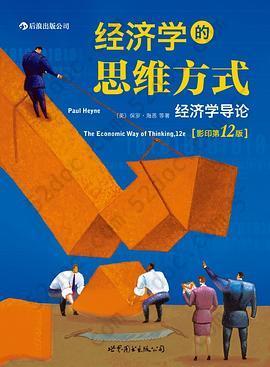注重体验与质量的电子书资源下载网站
分类于: 互联网 计算机基础
简介

经济学的思维方式(影印第12版): 经济学导论 豆 8.8分
资源最后更新于 2020-08-20 14:05:52
作者:保罗·海恩
出版社:世界图书出版公司·后浪出版公司
出版日期:2012-01
ISBN:9787510049927
文件格式: pdf
标签: 经济学 经济 Economics 金融 财经 商业 大学堂 贸易
简介· · · · · ·
《经济学的思维方式》是风靡国际的一部另类的经典经济学教科书。与主流经济学教材不同,本书回避了繁复的公式、函数、运算,通过深入浅出和饶有趣味的图画,将日常生活中纷繁复杂、看似毫无关联的一些社会现象,和一套富有一致性的思维框架结合起来,展现出一种“经济学的想象力”。正如道格拉斯•诺斯所说,经济学的力量就在于它是一种思维方式,本书的目的正是引导读者学会经济学推理方式,从而能够像经济学家一样思考问题。
《经济学的思维方式》已经被翻译成多种语言,享誉全世界,堪称经济学教育领域的一部标尺性著作。自2008年第11版翻译引进以来,在大专院校和非专业读者中都引起了相当的反响,荣获了多项优秀图书奖。作者在11版的基础上,对全书的结构和内容作了大量修订,带给读者全新的认识。影印第12版除了序言和前言采用中文,正文与英文原书完全一致,让读者充分体验阅读原文的乐趣与收获。
...
目录
出版前言 1
道格拉斯•C•诺斯序——经济学教材的革命 3
林毅夫中文第12版序——经济学的样貌与灵魂 5
张维迎中文第11版序——为什么没有免费的午餐 6
梁小民中文第11版序——像经济学家一样思考 8
Preface 前 言 10
1 The Economic Way of Thinking 经济学的思维方式 3
Recognizing Order 认识秩序 3
The Importance of Social Cooperation 社会协作的重要性 4
How Does It Happen? 这一切是怎么发生的? 5
An Apparatus of the Mind—the skill of the economist 智力工具——经济学家的技能 6
Cooperation through mutual adjustment 通过相互调整进行合作 9
Rules of the game 游戏规则 10
Property rights as rules of the game 产权作为游戏规则 11
The biases of economic theory: a weakness or a strength?
经济学理论的偏倚:缺点还是优点? 12
Biases or conclusions 偏倚还是结论? 14
No theory means poor theory 没有理论就是糟糕的理论 15
Once over lightly 简短回顾 16
Questions for discussion 问题与讨论 17
2 Efficiency, Exchange, and Comparative Advantage 效率、交换与比较优势 21
Goods and Bads 好品和坏品 22
The Myth of Material Wealth 物质财富的误区 23
Trade Creates Wealth 贸易创造财富 24
Is It Worth It? Efficiency and Values 值不值?效率与价值 25
Recognizing Trade-Offs: Comparing Opportunity Costs of Production
学会权衡:比较生产的机会成本 27
The Gains from Specialization and Exchange 从专业化和交换中获益 29
Why Specialize? 为什么要专业化? 30
From Individual Trade to International Trade, and Back Again
从人际贸易到国际贸易,再到人际贸易 30
Transaction Costs 交易成本 31
Incentives to Reduce Transaction Costs: Middlemen 降低交易成本的激励:中间人 32
Middlemen Create Information 中间人创造信息 33
Markets as Discovery Processes 市场作为发现过程 34
An Appendix: Economic Growth: Specialization, Exchange, and The Rule of Law
延伸阅读: 经济增长:专业化、交换和法治 35
Once Over Lightly 简短回顾 38
Questions for Discussion 问题与讨论 40
3 Substitutes Everywhere: The Concept of Demand 无处不在的替代:需求的概念 45
On the Notion of “Needs” 关于“需要” 45
Marginal Values 边际价值 47
Everyday Choices Are Marginal Choices 日常选择就是边际选择 48
The Demand Curve 需求曲线 49
The Law of Demand 需求法则 51
Demand and Quantity Demanded 需求和需求量 52
Demand Itself Can Change 需求自身也会变 53
Everything Depends on Everything Else 任何事物都依赖于其他事物 54
Misperceptions Caused by Inflation 通货膨胀导致的错觉 57
Time Is on Our Side 时间站在我们这一边 58
Price Elasticity of Demand 需求的价格弹性 58
Thinking About Elasticity 对弹性的思考 60
Elasticity and Total Receipts 弹性与总收入 61
The Myth of Vertical Demand 垂直需求的误区 62
All Scarce Goods Must Be Rationed Somehow 所有稀缺品都必须以某种方式分配 63
Is Money All That Matters? Money Costs, Other Costs, and Economic Calculation
只有钱重要吗?货币成本、其他成本和经济计算 65
Once Over Lightly 简短回顾 66
Questions for Discussion 问题与讨论 67
4 Cost and Choice: The Concept of Supply 成本和选择:供给的概念 75
Refresher on Opportunity Costs 对机会成本的复习 75
Costs Are Tied to Actions, Not Things 成本和行为而不是事物相关 76
What Do I Do Now? The Irrelevance of “Sunk Costs”
我现在该干什么?“沉没成本”的无关性 77
Producers’ Costs as Opportunity Costs 生产者的成本作为机会成本 78
Marginal Opportunity Costs 边际机会成本 80
Costs and Supply 成本和供给 81
The Supply Curve 供给曲线 83
Supply Itself Can Change 供给自身也会变 85
Marginal and Average Costs 边际成本和平均成本 86
The Cost of a Volunteer Military Force 志愿兵役制度的成本 87
Price Elasticity of Supply 供给的价格弹性 90
Cost as Justification 用成本论证正当性 91
Once Over Lightly 简短回顾 92
Questions for Discussion 问题与讨论 93
5 Supply and Demand: A Process of Coordination 供给与需求:协调的过程 99
The Market Is a Process of Plan Coordination 市场是计划协调的过程 101
The Basic Process 基本过程 102
Competition, Cooperation, and Market Clearing 竞争、合作与市场出清 104
Changing Market Conditions 变动的市场条件 106
Learning from Free-Market Prices 理解自由市场价格 106
Central Planning and the Knowledge Problem 中央计划和知识问题 108
An Appendix: Coordination Problems: Transaction Costs
延伸阅读:协调遇到的问题:交易成本 109
Once Over Lightly 简短回顾 114
Questions for Discussion 问题与讨论 115
6 Unintended Consequences: More Applications of Supply and Demand
无意的后果:供求规律的更多应用 119
Catastrophe and Confusion 自然灾害时供求的迷思 119
Catastrophe and Coordination 自然灾害时供求的协调 120
The Urge to Fix Prices 限价的冲动 122
Competition When Prices Are Fixed 价格固定时的竞争 124
Appropriate and Inappropriate Signals 恰当与不恰当的信号 125
Looking for an Apartment in the City? Read the Obituary!
想在城里找公寓吗?看讣告吧! 126
Strong Booze, Stronger Drugs: Criminal Incentives 烈酒、烈性毒品:犯罪的激励 128
Skim Milk, Whole Milk, and Gangster Milkmen 脱脂牛奶、全脂牛奶和“牛奶匪帮” 130
Supports and Surpluses 价格下限与生产过剩 130
Supply, Demand, and the Minimum Wage 供给、需求和最低工资 132
Slavery Goes Global, Again 奴隶贸易再次全球化 134
Do Costs Determine Prices? 成本决定价格吗? 135
The Dropouts Release Their First CD “退出者”发行了他们的第一张唱片 136
“There’s Gold in Them Thar Hills!” So What? “山里有金子!”那又怎么样? 137
Even Butchers Don’t Have the Guts 甚至连屠户都没这个胆子 137
Why Does It Cost So Much to Change Bedpans? 为什么医院里换个便盆都这么贵? 138
An Appendix: Framing Economic Questions Correctly 延伸阅读:正确地表述经济问题 139
Once Over Lightly 简短回顾 143
Questions for Discussion 问题与讨论 144
7 Profit and Loss 利润与亏损 153
Wage, Rent, and Interest: Incomes Established in Advance by Contract
工资、租金和利息:用合同事先确定的收入 153
Profit: Income That Can Be Positive or Negative 利润:可正可负的收入 154
Calculating Profit: What Should Be Included in Costs? 计算利润:哪些应该计入成本? 155
Comparing Economic Profit and Accounting Profit 比较经济利润和会计利润 156
Uncertainty: A Necessary Condition for Profit 不确定性:利润的必要条件 158
The Entrepreneur 企业家 159
The Entrepreneur as Residual Claimant 作为剩余索取者的企业家 160
Not-for-Profit Institutions 非营利机构 161
Entrepreneurship and the Market Process 企业家才能与市场过程 161
Mere Luck? 仅仅是运气吗? 163
Profit and Loss as Coordinating Signals: The Role of Monetary Calculation
利润与亏损作为协调的信号:货币计量的作用 164
Beware of Experts 小心专家 166
An Appendix: Profiteering in Futures Markets 延伸阅读: 在期货市场上赚取利润 167
Once Over Lightly 简短回顾 173
Questions for Discussion 问题与讨论 174
8 Price Searching 觅 价 183
The Popular Theory of Price Setting 定价的流行理论 183
Introducing Ed Sike 艾德•赛克登场 184
The Basic Rule for Maximizing Net Revenue 净收益最大化的基本法则 186
The Concept of Marginal Revenue 边际收益的概念 186
Why Marginal Revenue Is Less Than Price 为什么边际收益会低于价格? 187
Setting Marginal Revenue to Equal Marginal Cost 让边际收益等于边际成本 188
What About Those Empty Seats? 那些空座位呢? 189
The Price Discriminator’s Dilemma 差别定价者的困境 189
The College as Price Searcher 学校作为觅价者 190
Some Strategies for Price Discrimination 一些差别定价策略 192
Ed Sike Finds a Way 艾德•赛克找到了一个办法 192
Resentment and Rationale 不满情绪与“合理化”辩解 194
Lunch and Dinner Prices 午餐价和晚餐价 194
Cost-Plus-Markup Reconsidered 重新思考成本加成 196
Once Over Lightly 简短回顾 196
Questions for Discussion 问题与讨论 197
9 Competition and Government Policy 竞争与政府政策 205
Competition as a Process 竞争作为一个过程 205
The Pressures of Competition 竞争的压力 207
Controlling Competition 控制竞争 208
Restrictions on Competition 对竞争的限制 210
Competition for the Key Resource:
The $600,000 Taxi License 对核心资源的竞争:60万美元的出租车执照 211
Competition and Property Rights 竞争和财产权 211
The Ambivalence of Government Policies 政府政策的矛盾性 212
Selling Below Cost 低于成本销售 212
What Is the Appropriate Cost? 什么是适当的成本? 213
“Predators” and Competition “掠夺者”和竞争 215
Regulating Prices 价格管制 216
“Antitrust” Policy “反托拉斯”政策 218
Interpretations and Applications 解释和应用 218
Vertical Restraints: Competitive or Anticompetitive 纵向限制:竞争或反竞争 220
The Range of Opinion 观点谱系 221
Toward Evaluation 对于竞争政策的评估 222
Once Over Lightly 简短回顾 223
Questions for Discussion 问题与讨论 223
10 Externalities and Conflicting Rights 外部性与冲突的权利 229
Externalities, Negative and Positive 正外部性和负外部性 229
Perfection Is Unattainable 十全十美无法达到 230
Negotiation 协 商 231
Reducing Externalities Through Adjudication 通过裁定减少外部性 233
The Case of the Complaining Homeowner 抱怨的房主 233
The Importance of Precedents 先例的重要性 234
The Problem of Radical Change 剧烈变化带来的问题 235
Reducing Externalities Through Legislation 通过立法减少外部性 236
Minimizing Costs 把成本降到最低 237
Another Approach: Taxing Emissions 另一种办法:征收排放税 238
Licenses to Pollute? 污染许可证? 240
Efficiency and Fairness 效率和公平 240
The Bubble Concept 泡泡法 241
Rights and the Social Problem of Pollution 权利和污染带来的社会问题 243
Traffic Congestion as an Externality 交通拥堵作为一种外部性 243
Once Over Lightly 简短回顾 245
Questions for Discussion 问题与讨论 245
11 Markets and Government 市场与政府 255
Private Versus Public? 私人还是公共? 255
Competition and Individualism 竞争和个人主义 256
Economic Theory and Government Action 经济理论和政府行为 257
The Right to Use Coercion 采取强制的权利 258
Is Government Necessary? 政府是必要的吗? 259
Excluding Nonpayers 排除不付钱的人 260
The Free-Rider Problem 搭便车问题 261
Positive Externalities and Free Riders 正外部性和搭便车 262
Law and Order 法律和秩序 263
National Defense 国 防 263
Roads and Schools 道路和学校 264
Income Redistribution 收入再分配 264
The Regulation of Voluntary Exchange 自愿交易的管制 265
Government and the Public Interest 政府和公共利益 266
Information and Democratic Governments 信息和民主政府 266
The Interests of Elected Officials 民选官员的利益 267
Concentrated Benefits, Dispersed Costs 集中的收益,分散的成本 269
Positive Externalities and Government Policies 正外部性和政府政策 270
How Do People Identify the Public Interest? 人们如何界定公共利益 271
The Prisoners’ Dilemma 囚徒困境 272
The Limits of Political Institutions 政治制度的局限 274
Once Over Lightly 简短回顾 275
Questions for Discussion 问题与讨论 276
12 Measuring the Overall Performance of Economic Systems
衡量经济系统的整体绩效 283
Gross Domestic Product 国内生产总值 284
GDP or GNP? GDP还是GNP? 285
GDP as Total Income Created in the Domestic Economy
GDP作为国内经济创造的总收入 286
GDP Is Not a Measure of All Purchases in the Economy
GDP衡量的并非经济系统中的所有购买 287
GDP as Total Value Added GDP作为总附加价值 288
Is Value Added Always Positive? 附加价值是否总是正的? 289
Loose Ends: Unsold Inventories and Used Goods 零散问题:未出售的存货和二手货 290
Aggregate Fluctuations 总量波动 291
Unemployment and Nonemployment 失业和未就业 292
Employed, Not Employed, and Unemployed 就业、未就业和失业 293
Labor-Market Decisions 劳动力市场中的决策 294
Unemployment and Recessions 失业和经济衰退 295
Inflation 通货膨胀 296
The Difficulties of Monetary Calculation 货币计量的难题 298
Recession and Inflation Since 1960 1960年以来的经济衰退和通货膨胀 298
What Causes Aggregate Fluctuations? 什么导致总量波动? 301
An Appendix: Limitations of National Income Accounting
延伸阅读:国民收入核算的局限 303
Once Over Lightly 简短回顾 307
Questions for Discussion 问题与讨论 308
13 The Wealth of Nations: Globalization and Economic Growth
国家的财富:全球化与经济增长 313
Who Is Rich, Who Is Poor? 谁富,谁穷? 314
The Historical Record 历史记录 314
Sources of Economic Growth 经济增长的源泉 316
Foreign Investment 外国投资 318
Human Capital 人力资本 321
Oil Comes from Our Minds 石油来自我们的头脑 322
Economic Freedom Index 经济自由度指数 323
The Developmental Power of Private Property Rights 私有产权对发展的作用 323
The Asian Record 亚洲记录 324
Outside of Asia 亚洲之外 327
Globalization and Its Discontents 全球化及其不满 329
The Power of Popular Opinion 公众意见的力量 331
The Power of Special Interests 特殊利益的力量 332
The Outsourcing Controversy: Soundbytes vs. Analysis 外包的争论:脱口秀还是分析 332
An Appendix: The Difficulties of International GDP Comparisons
延伸阅读:跨国GDP比较的难点 334
Once Over Lightly 简短回顾 337
Questions for Discussion 问题与讨论 338
14 Money 货 币 341
The Evolution of Money 货币的演化 341
The Myth of Fiat Money 法定货币的故事 342
The Nature of Money Today 当今货币的性质 343
So How Much Money Is Out There? 市面上有多少货币? 344
The Creation of Money 货币的创造 345
What Can Be Created Can Be Destroyed 任何可以创造出来的东西都可以被灭失 346
Credibility and Confidence 信用和信任 347
Banks Under Regulation: Legal Reserve Requirements
受管制的银行:法定存款准备金制度 348
The Fed as Monitor and Rule Enforcer 美联储作为监督者和规则实施者 349
The Tools Used by the Fed 美联储的工具 352
The Discount Rate 贴现率 352
Open Market Operations 公开市场操作 353
But Who Is Really in Charge? 但是谁真正做主呢? 354
An Appendix: What about Gold? 延伸阅读:那么黄金呢? 355
Once Over Lightly 简短回顾 357
Questions for Discussion 问题与讨论 357
15 Economic Performance and Real-World Politics 经济绩效和真实世界中的政治 363
The Great Depression 经济大萧条 363
What Really Happens in a Recession? 经济衰退期间究竟会发生什么? 365
A Cluster of Errors 错误集群 365
Monetary Mismanagement, Monetary Miscalculation 货币的不良管理和错误计算 367
Monetary Equilibrium 货币均衡 369
When Is Monetary Policy Effective? 货币政策何时有效? 370
The Case for Fiscal Policy 财政政策 371
The Necessity of Good Timing 掌握好时机的必要性 372
The Federal Budget as a Policy Tool 联邦预算作为一种政策工具 374
Time Horizons and Politics 任期和政治 375
Deficits Unlimited 无限度的赤字 376
Why Not Government at All Levels? 为什么不是各级政府都如此? 379
Discretion and Rules 自由裁量和规则 381
Who Is at the Controls? 谁掌权? 383
Once Over Lightly 简短回顾 385
Questions for Discussion 问题与讨论 386
16 Renewal of the Debate: Some Parting Thoughts 辩论的更新:临别的思想赠言 395
The Great Financial Crisis of 2008 . . . and Beyond 2008年及其后的金融大海啸 395
But First: The S&L Crisis of the 1980s 先得回顾20世纪80年代的存贷危机 397
The Subprime Mortgage Crisis: Hurting the Disadvantaged by Helping the Disadvantaged
次贷危机:对弱势群体的帮助反而害了他们 398
Profit, Loss, and Bailout: Can a Government Agency Be a Good Entrepreneur?
利润、亏损和援助:政府机构可以成为一个好企业家吗? 400
What Economists Know and the Limitations of Economics
经济学家知道什么和经济学的局限 402
Beyond Mere Economics 超越纯粹的经济学 404
Glossary 重要词汇 407
Index 索 引 415
道格拉斯•C•诺斯序——经济学教材的革命 3
林毅夫中文第12版序——经济学的样貌与灵魂 5
张维迎中文第11版序——为什么没有免费的午餐 6
梁小民中文第11版序——像经济学家一样思考 8
Preface 前 言 10
1 The Economic Way of Thinking 经济学的思维方式 3
Recognizing Order 认识秩序 3
The Importance of Social Cooperation 社会协作的重要性 4
How Does It Happen? 这一切是怎么发生的? 5
An Apparatus of the Mind—the skill of the economist 智力工具——经济学家的技能 6
Cooperation through mutual adjustment 通过相互调整进行合作 9
Rules of the game 游戏规则 10
Property rights as rules of the game 产权作为游戏规则 11
The biases of economic theory: a weakness or a strength?
经济学理论的偏倚:缺点还是优点? 12
Biases or conclusions 偏倚还是结论? 14
No theory means poor theory 没有理论就是糟糕的理论 15
Once over lightly 简短回顾 16
Questions for discussion 问题与讨论 17
2 Efficiency, Exchange, and Comparative Advantage 效率、交换与比较优势 21
Goods and Bads 好品和坏品 22
The Myth of Material Wealth 物质财富的误区 23
Trade Creates Wealth 贸易创造财富 24
Is It Worth It? Efficiency and Values 值不值?效率与价值 25
Recognizing Trade-Offs: Comparing Opportunity Costs of Production
学会权衡:比较生产的机会成本 27
The Gains from Specialization and Exchange 从专业化和交换中获益 29
Why Specialize? 为什么要专业化? 30
From Individual Trade to International Trade, and Back Again
从人际贸易到国际贸易,再到人际贸易 30
Transaction Costs 交易成本 31
Incentives to Reduce Transaction Costs: Middlemen 降低交易成本的激励:中间人 32
Middlemen Create Information 中间人创造信息 33
Markets as Discovery Processes 市场作为发现过程 34
An Appendix: Economic Growth: Specialization, Exchange, and The Rule of Law
延伸阅读: 经济增长:专业化、交换和法治 35
Once Over Lightly 简短回顾 38
Questions for Discussion 问题与讨论 40
3 Substitutes Everywhere: The Concept of Demand 无处不在的替代:需求的概念 45
On the Notion of “Needs” 关于“需要” 45
Marginal Values 边际价值 47
Everyday Choices Are Marginal Choices 日常选择就是边际选择 48
The Demand Curve 需求曲线 49
The Law of Demand 需求法则 51
Demand and Quantity Demanded 需求和需求量 52
Demand Itself Can Change 需求自身也会变 53
Everything Depends on Everything Else 任何事物都依赖于其他事物 54
Misperceptions Caused by Inflation 通货膨胀导致的错觉 57
Time Is on Our Side 时间站在我们这一边 58
Price Elasticity of Demand 需求的价格弹性 58
Thinking About Elasticity 对弹性的思考 60
Elasticity and Total Receipts 弹性与总收入 61
The Myth of Vertical Demand 垂直需求的误区 62
All Scarce Goods Must Be Rationed Somehow 所有稀缺品都必须以某种方式分配 63
Is Money All That Matters? Money Costs, Other Costs, and Economic Calculation
只有钱重要吗?货币成本、其他成本和经济计算 65
Once Over Lightly 简短回顾 66
Questions for Discussion 问题与讨论 67
4 Cost and Choice: The Concept of Supply 成本和选择:供给的概念 75
Refresher on Opportunity Costs 对机会成本的复习 75
Costs Are Tied to Actions, Not Things 成本和行为而不是事物相关 76
What Do I Do Now? The Irrelevance of “Sunk Costs”
我现在该干什么?“沉没成本”的无关性 77
Producers’ Costs as Opportunity Costs 生产者的成本作为机会成本 78
Marginal Opportunity Costs 边际机会成本 80
Costs and Supply 成本和供给 81
The Supply Curve 供给曲线 83
Supply Itself Can Change 供给自身也会变 85
Marginal and Average Costs 边际成本和平均成本 86
The Cost of a Volunteer Military Force 志愿兵役制度的成本 87
Price Elasticity of Supply 供给的价格弹性 90
Cost as Justification 用成本论证正当性 91
Once Over Lightly 简短回顾 92
Questions for Discussion 问题与讨论 93
5 Supply and Demand: A Process of Coordination 供给与需求:协调的过程 99
The Market Is a Process of Plan Coordination 市场是计划协调的过程 101
The Basic Process 基本过程 102
Competition, Cooperation, and Market Clearing 竞争、合作与市场出清 104
Changing Market Conditions 变动的市场条件 106
Learning from Free-Market Prices 理解自由市场价格 106
Central Planning and the Knowledge Problem 中央计划和知识问题 108
An Appendix: Coordination Problems: Transaction Costs
延伸阅读:协调遇到的问题:交易成本 109
Once Over Lightly 简短回顾 114
Questions for Discussion 问题与讨论 115
6 Unintended Consequences: More Applications of Supply and Demand
无意的后果:供求规律的更多应用 119
Catastrophe and Confusion 自然灾害时供求的迷思 119
Catastrophe and Coordination 自然灾害时供求的协调 120
The Urge to Fix Prices 限价的冲动 122
Competition When Prices Are Fixed 价格固定时的竞争 124
Appropriate and Inappropriate Signals 恰当与不恰当的信号 125
Looking for an Apartment in the City? Read the Obituary!
想在城里找公寓吗?看讣告吧! 126
Strong Booze, Stronger Drugs: Criminal Incentives 烈酒、烈性毒品:犯罪的激励 128
Skim Milk, Whole Milk, and Gangster Milkmen 脱脂牛奶、全脂牛奶和“牛奶匪帮” 130
Supports and Surpluses 价格下限与生产过剩 130
Supply, Demand, and the Minimum Wage 供给、需求和最低工资 132
Slavery Goes Global, Again 奴隶贸易再次全球化 134
Do Costs Determine Prices? 成本决定价格吗? 135
The Dropouts Release Their First CD “退出者”发行了他们的第一张唱片 136
“There’s Gold in Them Thar Hills!” So What? “山里有金子!”那又怎么样? 137
Even Butchers Don’t Have the Guts 甚至连屠户都没这个胆子 137
Why Does It Cost So Much to Change Bedpans? 为什么医院里换个便盆都这么贵? 138
An Appendix: Framing Economic Questions Correctly 延伸阅读:正确地表述经济问题 139
Once Over Lightly 简短回顾 143
Questions for Discussion 问题与讨论 144
7 Profit and Loss 利润与亏损 153
Wage, Rent, and Interest: Incomes Established in Advance by Contract
工资、租金和利息:用合同事先确定的收入 153
Profit: Income That Can Be Positive or Negative 利润:可正可负的收入 154
Calculating Profit: What Should Be Included in Costs? 计算利润:哪些应该计入成本? 155
Comparing Economic Profit and Accounting Profit 比较经济利润和会计利润 156
Uncertainty: A Necessary Condition for Profit 不确定性:利润的必要条件 158
The Entrepreneur 企业家 159
The Entrepreneur as Residual Claimant 作为剩余索取者的企业家 160
Not-for-Profit Institutions 非营利机构 161
Entrepreneurship and the Market Process 企业家才能与市场过程 161
Mere Luck? 仅仅是运气吗? 163
Profit and Loss as Coordinating Signals: The Role of Monetary Calculation
利润与亏损作为协调的信号:货币计量的作用 164
Beware of Experts 小心专家 166
An Appendix: Profiteering in Futures Markets 延伸阅读: 在期货市场上赚取利润 167
Once Over Lightly 简短回顾 173
Questions for Discussion 问题与讨论 174
8 Price Searching 觅 价 183
The Popular Theory of Price Setting 定价的流行理论 183
Introducing Ed Sike 艾德•赛克登场 184
The Basic Rule for Maximizing Net Revenue 净收益最大化的基本法则 186
The Concept of Marginal Revenue 边际收益的概念 186
Why Marginal Revenue Is Less Than Price 为什么边际收益会低于价格? 187
Setting Marginal Revenue to Equal Marginal Cost 让边际收益等于边际成本 188
What About Those Empty Seats? 那些空座位呢? 189
The Price Discriminator’s Dilemma 差别定价者的困境 189
The College as Price Searcher 学校作为觅价者 190
Some Strategies for Price Discrimination 一些差别定价策略 192
Ed Sike Finds a Way 艾德•赛克找到了一个办法 192
Resentment and Rationale 不满情绪与“合理化”辩解 194
Lunch and Dinner Prices 午餐价和晚餐价 194
Cost-Plus-Markup Reconsidered 重新思考成本加成 196
Once Over Lightly 简短回顾 196
Questions for Discussion 问题与讨论 197
9 Competition and Government Policy 竞争与政府政策 205
Competition as a Process 竞争作为一个过程 205
The Pressures of Competition 竞争的压力 207
Controlling Competition 控制竞争 208
Restrictions on Competition 对竞争的限制 210
Competition for the Key Resource:
The $600,000 Taxi License 对核心资源的竞争:60万美元的出租车执照 211
Competition and Property Rights 竞争和财产权 211
The Ambivalence of Government Policies 政府政策的矛盾性 212
Selling Below Cost 低于成本销售 212
What Is the Appropriate Cost? 什么是适当的成本? 213
“Predators” and Competition “掠夺者”和竞争 215
Regulating Prices 价格管制 216
“Antitrust” Policy “反托拉斯”政策 218
Interpretations and Applications 解释和应用 218
Vertical Restraints: Competitive or Anticompetitive 纵向限制:竞争或反竞争 220
The Range of Opinion 观点谱系 221
Toward Evaluation 对于竞争政策的评估 222
Once Over Lightly 简短回顾 223
Questions for Discussion 问题与讨论 223
10 Externalities and Conflicting Rights 外部性与冲突的权利 229
Externalities, Negative and Positive 正外部性和负外部性 229
Perfection Is Unattainable 十全十美无法达到 230
Negotiation 协 商 231
Reducing Externalities Through Adjudication 通过裁定减少外部性 233
The Case of the Complaining Homeowner 抱怨的房主 233
The Importance of Precedents 先例的重要性 234
The Problem of Radical Change 剧烈变化带来的问题 235
Reducing Externalities Through Legislation 通过立法减少外部性 236
Minimizing Costs 把成本降到最低 237
Another Approach: Taxing Emissions 另一种办法:征收排放税 238
Licenses to Pollute? 污染许可证? 240
Efficiency and Fairness 效率和公平 240
The Bubble Concept 泡泡法 241
Rights and the Social Problem of Pollution 权利和污染带来的社会问题 243
Traffic Congestion as an Externality 交通拥堵作为一种外部性 243
Once Over Lightly 简短回顾 245
Questions for Discussion 问题与讨论 245
11 Markets and Government 市场与政府 255
Private Versus Public? 私人还是公共? 255
Competition and Individualism 竞争和个人主义 256
Economic Theory and Government Action 经济理论和政府行为 257
The Right to Use Coercion 采取强制的权利 258
Is Government Necessary? 政府是必要的吗? 259
Excluding Nonpayers 排除不付钱的人 260
The Free-Rider Problem 搭便车问题 261
Positive Externalities and Free Riders 正外部性和搭便车 262
Law and Order 法律和秩序 263
National Defense 国 防 263
Roads and Schools 道路和学校 264
Income Redistribution 收入再分配 264
The Regulation of Voluntary Exchange 自愿交易的管制 265
Government and the Public Interest 政府和公共利益 266
Information and Democratic Governments 信息和民主政府 266
The Interests of Elected Officials 民选官员的利益 267
Concentrated Benefits, Dispersed Costs 集中的收益,分散的成本 269
Positive Externalities and Government Policies 正外部性和政府政策 270
How Do People Identify the Public Interest? 人们如何界定公共利益 271
The Prisoners’ Dilemma 囚徒困境 272
The Limits of Political Institutions 政治制度的局限 274
Once Over Lightly 简短回顾 275
Questions for Discussion 问题与讨论 276
12 Measuring the Overall Performance of Economic Systems
衡量经济系统的整体绩效 283
Gross Domestic Product 国内生产总值 284
GDP or GNP? GDP还是GNP? 285
GDP as Total Income Created in the Domestic Economy
GDP作为国内经济创造的总收入 286
GDP Is Not a Measure of All Purchases in the Economy
GDP衡量的并非经济系统中的所有购买 287
GDP as Total Value Added GDP作为总附加价值 288
Is Value Added Always Positive? 附加价值是否总是正的? 289
Loose Ends: Unsold Inventories and Used Goods 零散问题:未出售的存货和二手货 290
Aggregate Fluctuations 总量波动 291
Unemployment and Nonemployment 失业和未就业 292
Employed, Not Employed, and Unemployed 就业、未就业和失业 293
Labor-Market Decisions 劳动力市场中的决策 294
Unemployment and Recessions 失业和经济衰退 295
Inflation 通货膨胀 296
The Difficulties of Monetary Calculation 货币计量的难题 298
Recession and Inflation Since 1960 1960年以来的经济衰退和通货膨胀 298
What Causes Aggregate Fluctuations? 什么导致总量波动? 301
An Appendix: Limitations of National Income Accounting
延伸阅读:国民收入核算的局限 303
Once Over Lightly 简短回顾 307
Questions for Discussion 问题与讨论 308
13 The Wealth of Nations: Globalization and Economic Growth
国家的财富:全球化与经济增长 313
Who Is Rich, Who Is Poor? 谁富,谁穷? 314
The Historical Record 历史记录 314
Sources of Economic Growth 经济增长的源泉 316
Foreign Investment 外国投资 318
Human Capital 人力资本 321
Oil Comes from Our Minds 石油来自我们的头脑 322
Economic Freedom Index 经济自由度指数 323
The Developmental Power of Private Property Rights 私有产权对发展的作用 323
The Asian Record 亚洲记录 324
Outside of Asia 亚洲之外 327
Globalization and Its Discontents 全球化及其不满 329
The Power of Popular Opinion 公众意见的力量 331
The Power of Special Interests 特殊利益的力量 332
The Outsourcing Controversy: Soundbytes vs. Analysis 外包的争论:脱口秀还是分析 332
An Appendix: The Difficulties of International GDP Comparisons
延伸阅读:跨国GDP比较的难点 334
Once Over Lightly 简短回顾 337
Questions for Discussion 问题与讨论 338
14 Money 货 币 341
The Evolution of Money 货币的演化 341
The Myth of Fiat Money 法定货币的故事 342
The Nature of Money Today 当今货币的性质 343
So How Much Money Is Out There? 市面上有多少货币? 344
The Creation of Money 货币的创造 345
What Can Be Created Can Be Destroyed 任何可以创造出来的东西都可以被灭失 346
Credibility and Confidence 信用和信任 347
Banks Under Regulation: Legal Reserve Requirements
受管制的银行:法定存款准备金制度 348
The Fed as Monitor and Rule Enforcer 美联储作为监督者和规则实施者 349
The Tools Used by the Fed 美联储的工具 352
The Discount Rate 贴现率 352
Open Market Operations 公开市场操作 353
But Who Is Really in Charge? 但是谁真正做主呢? 354
An Appendix: What about Gold? 延伸阅读:那么黄金呢? 355
Once Over Lightly 简短回顾 357
Questions for Discussion 问题与讨论 357
15 Economic Performance and Real-World Politics 经济绩效和真实世界中的政治 363
The Great Depression 经济大萧条 363
What Really Happens in a Recession? 经济衰退期间究竟会发生什么? 365
A Cluster of Errors 错误集群 365
Monetary Mismanagement, Monetary Miscalculation 货币的不良管理和错误计算 367
Monetary Equilibrium 货币均衡 369
When Is Monetary Policy Effective? 货币政策何时有效? 370
The Case for Fiscal Policy 财政政策 371
The Necessity of Good Timing 掌握好时机的必要性 372
The Federal Budget as a Policy Tool 联邦预算作为一种政策工具 374
Time Horizons and Politics 任期和政治 375
Deficits Unlimited 无限度的赤字 376
Why Not Government at All Levels? 为什么不是各级政府都如此? 379
Discretion and Rules 自由裁量和规则 381
Who Is at the Controls? 谁掌权? 383
Once Over Lightly 简短回顾 385
Questions for Discussion 问题与讨论 386
16 Renewal of the Debate: Some Parting Thoughts 辩论的更新:临别的思想赠言 395
The Great Financial Crisis of 2008 . . . and Beyond 2008年及其后的金融大海啸 395
But First: The S&L Crisis of the 1980s 先得回顾20世纪80年代的存贷危机 397
The Subprime Mortgage Crisis: Hurting the Disadvantaged by Helping the Disadvantaged
次贷危机:对弱势群体的帮助反而害了他们 398
Profit, Loss, and Bailout: Can a Government Agency Be a Good Entrepreneur?
利润、亏损和援助:政府机构可以成为一个好企业家吗? 400
What Economists Know and the Limitations of Economics
经济学家知道什么和经济学的局限 402
Beyond Mere Economics 超越纯粹的经济学 404
Glossary 重要词汇 407
Index 索 引 415








